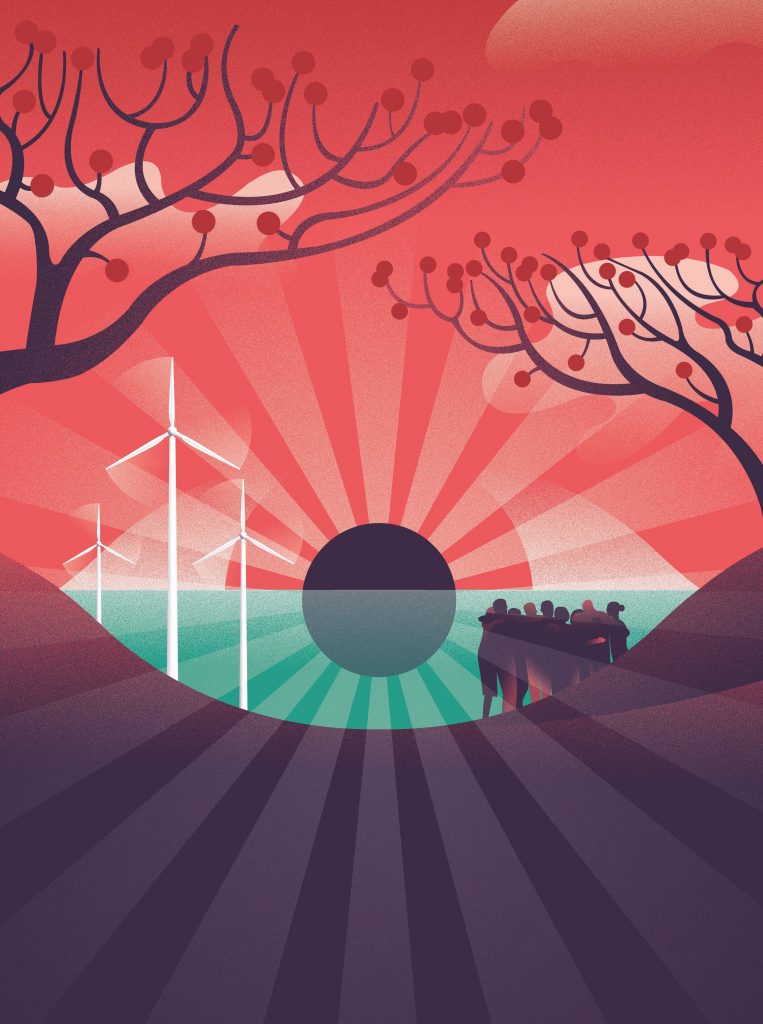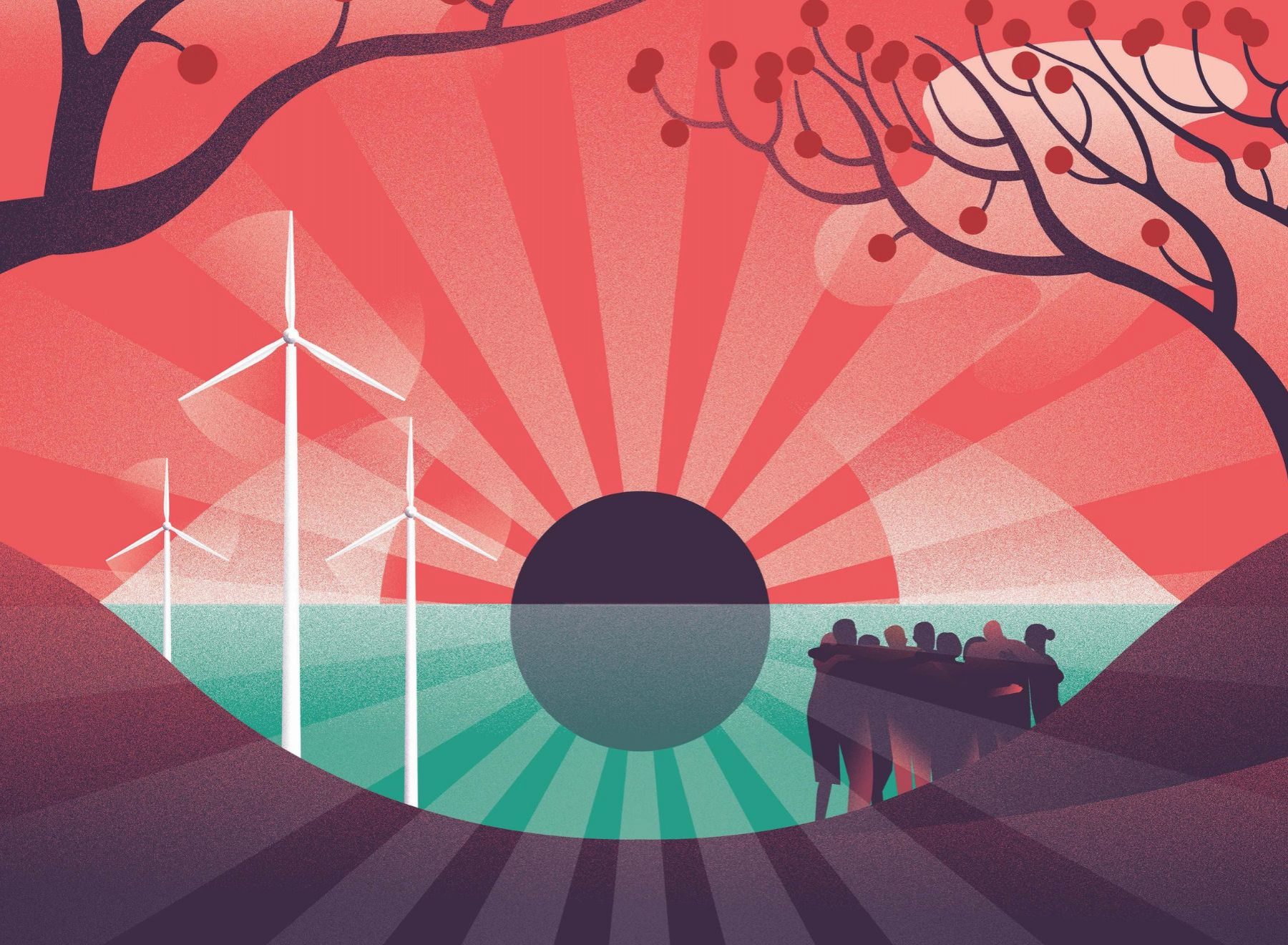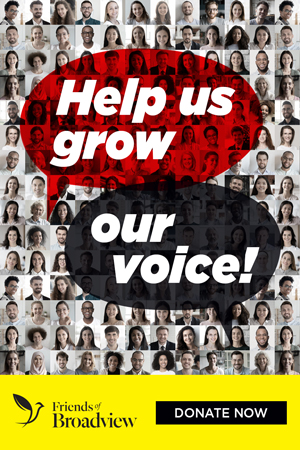I grew up Indigenous in Canada and inherited the intergenerational trauma of that colonial experience.
Like many young Indigenous people, I spent my young adulthood struggling to discern who I was, and medicating with drugs and alcohol. While I grew up in the United Church, during the wilderness walk that I took, I lost any sense of direction or feeling of hope.
When I was newly sober, I attended a local United Church community of faith, and it happened to be the first Sunday of Advent. The minister was preaching about waiting in anticipation for a life-changing event that was on the horizon — but wasn’t here yet. It was a balm to my aching soul, the hope that I needed. It was an invitation to keep my vision focused not on the immediate challenges I faced, but just ahead of what I could anticipate.
Perhaps this experience explains, in part, why the Advent season has been my favourite time in the liturgical calendar for the past two decades. The simple promise of a new beginning that is not yet realized — but is possible — is an inspiring hope that I have held on to for a long time.
These days, over 20 years sober, and an ordained minister for 15 years, I find the intimately personal hope for individual change is less on my mind. As I raise my children in a world that still pushes Indigenous people to the margins, and that faces multiple growing crises, I am now often thinking of the broader horizons of social change.
Want to read more from Broadview? Consider subscribing to one of our newsletters.
Our Advent readings from the Gospel of Matthew this year draw heavily on prophetic imagery that resonates deeply with me. In the opening verses of Matthew 3, we hear John the Baptist’s wilderness call to “Repent, for the kingdom of heaven has come near.”
In a world that sometimes feels as if it’s going completely off the rails, perhaps it’s time that we take more seriously the Advent call to repentance. Just as I had to take seriously the decision to make choices that led to a better life, no matter how entrenched some of my habits were, we are faced with the challenge to change our way of life as a society. And we have much for which to repent.
Increased political divisions, geopolitical conflicts and energy crises all come to mind. Income inequality is also growing at an alarming rate in Canada, according to the Conference Board of Canada. To make matters worse, the cost of living, combined with the amount of debt under which people are living, means wages have been stagnating. Pocketbooks are strained.
So too are relationships between settlers and Indigenous Canadians, as the latter continue to fight for land and resources. And while a recent Environics survey suggests that there is more understanding of colonialism and the legacy of residential schools, and fewer Canadians attribute the struggles faced by Indigenous peoples to individual choices, it also indicates that optimism about the prospect of achieving reconciliation is fading. Certainly, with the findings of unmarked graves in June 2021, many Canadians are aware that the work of reconciliation will be hard and prolonged.

The climate crisis, of course, continues to present an existential threat that we don’t take seriously enough. We focus a lot on individual consumer actions, like air travel and recycling, because they’re easier to target and are largely affected by choices we make with disposable income. But to make the biggest impact on climate requires significant capital investments, especially in terms of how we heat and cool our homes and other buildings. These investments are harder in a world where most of us need to stretch dollars further just to survive, and the solutions aren’t always one-size-fits-all.
Inequality, ongoing colonialism and the climate crisis are all massive social problems that require a lot of education to achieve the social changes they demand. And we live in a world where information comes at us in small quantities at alarming rates, making it difficult to process and integrate. Disinformation is easier to come by, and fatigue more likely. We don’t want to think deeply about these things, and our busyness makes it easy to not think deeply about these things.
And so, we exist in a world where it becomes increasingly difficult to live up to the values we hold.
In a world that sometimes feels as if it’s going completely off the rails, perhaps it’s time to take more seriously the Advent call to repentance.
Do we want to perpetuate a world where the rich get richer, the middle class disappears and the poorest get less and less? For most of us, the answer is no.
Do we intend to uphold systems of racism that mean Indigenous, Black and other people of colour continue to face barriers? The answer is very likely a resounding no. We don’t like to think of ourselves as individually racist, but we often benefit from systemic racism based on the way our society is structured and the histories of colonialism and slavery.
Do we intend to put the lives of humanity and a lot of the rest of the created order at risk? Never. Most Canadians agree that the climate crisis is real and that it’s caused by humans. Still, we are not making the most impactful choices, individually, nor are we informing our government that we want to see meaningful policy change.
So you might be asking: “What does this all have to do with Advent or with the Gospel, Moderator?”
In those days, as the Gospel of Matthew proclaims, John the Baptist appeared in the wilderness, proclaiming “Repent, for the Kingdom of God has come near.” His preaching foretold that Jesus was the Messiah, and people flocked to him at the Jordan to be baptized and confess their sins. But when the priestly class came to John the Baptist, he rebuked them, calling them a brood of vipers. He warned them not to rely on their lineage back to David to save them.
Instead, he said, unless they truly repented, they would be held accountable through the change that was about to come with the arrival of the Messiah. He instructed them: “Bear fruit worthy of repentance” (Matthew 3:8).
Bear fruit worthy of repentance. This phrase leaps off the page to me. The way that systemic injustice works — whether it relates to inequality, reconciliation or climate change — is that the status quo is easier and benefits those with power, and change is hard. Which
means that we can fall so short of living into the things we say are our values.
More on Broadview:
- Emmanuel College’s new principal on her big vision for the theological school
- Carmen Lansdowne is now the 1st Indigenous woman to lead a Canadian church
- Uyghur forced labour permeates retail, but you can make a difference this Christmas
In The United Church of Canada, we say that we want a guaranteed livable wage, that we want to practise reconciliation in action and that we want to reduce our greenhouse gas emissions. And yet we are so often confronted by the person living in poverty, the Indigenous person or the climate activist who says we are not even doing the bare minimum. We are not bearing fruit worthy of repentance. We are relying on our lineage as a church focused on social justice to preach what we believe — and yet when faced with hard everyday choices, we are not bearing fruit worthy of repentance.
When we expect governments to deal with social issues, but also expect our taxes to decrease, we are not bearing fruit worthy of repentance. When we say we want to take meaningful action on reconciliation, but then don’t hold our employers and governments accountable for that meaningful action, we are not bearing fruit worthy of repentance.
But John the Baptist doesn’t say no outright to those who rely on their status and lineage. He says, “Do the hard work.” The hope of the Christmas story and the new life we receive in the coming of the Christ child — a life that we await with deep anticipation and a longing for transformation — is that change is possible. It just hasn’t come yet.
For me, this is what the season of Advent is for: it’s a time for reflection, for recentring our minds on that hope and for dreaming of what is possible. When the Christ child arrives — and we can imagine their tiny hands and feet, the newborn face scrunches as they lie in contentment — all things are possible. It’s a relatable feeling. We feel it when we hold our children, our grandchildren or our niblings (a non-gendered word for our siblings’ children) for the first time. We want the very best for them, and their new life is full of promise.
Humans are amazing when we stay in a posture of hope and possibility. And hope and possibility are what we need if we truly want to bear fruit worthy of repentance.
We believe that we are not alone and that we live in God’s world, who has created and is creating. We believe that we are called by God to co-create a world where we can live, and live in abundance.
Let this Advent be a season of reflection for the world we love and the world we could almost be — if only we would bear fruit worthy of repentance.
***
Rt. Rev. Carmen Lansdowne is the 44th moderator of The United Church of Canada.
This story first appeared in Broadview’s December 2022 issue with the title “Hope on the horizon.”
Thanks for reading!
Did you know Broadview is the only media organization in Canada dedicated to covering progressive Christian news and views?
We are also a registered charity and rely on subscriptions and tax-deductible donations to keep our trustworthy, independent and award-winning journalism alive.
Please help us continue to share stories that open minds, inspire meaningful action and foster a world of compassion. Don’t wait. We can’t do it without you.
Here are some ways you can support us:
Thank you so very much for your generous support! Together, we can make a difference.
Jocelyn Bell, Editor/Publisher, CEO and Trisha Elliott, Executive Director


Comments
Debra Leedham says:
Good point. Many complex issues encourage individuals to concentrate on their own problems, ignoring the mission of Christ. My own situation with the difficulties of home care in this province keeps me away from a call to repentance. Christians rely too much on the promise of hope, instead of doing the work to repent first.